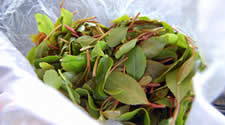 Muslim community leaders in Texas are protesting the latest outbreak of the perennial hype over the khat plant and its supposed links to terrorism. It began when a traffic stop near Houston last year turned up two men chewing the midly psychoactive but thoroughly illegal leaf. This sparked a year-long investigation involving local, state and federal agencies that has so far resulted in more than a half-dozen arrests. The Texas Department of Public Safety took the opportunity to link khat to terrorism in its statewide threat assessment. The statement referred to the "chewable narcotic plant grown in the Horn of Africa whose sale abroad is suspected to benefit Africa-based terrorist organizations such as al-Shabaab." That assessment, the Austin American-Statesman reported last month, was based on Congressional testimony given more than a decade ago by Steven McCraw—then-FBI-assistant director, now DPS director—who said it is likely that khat proceeds "pass through the hands of suspected [Islamic militants] and other persons with possible ties to terrorist groups."
Muslim community leaders in Texas are protesting the latest outbreak of the perennial hype over the khat plant and its supposed links to terrorism. It began when a traffic stop near Houston last year turned up two men chewing the midly psychoactive but thoroughly illegal leaf. This sparked a year-long investigation involving local, state and federal agencies that has so far resulted in more than a half-dozen arrests. The Texas Department of Public Safety took the opportunity to link khat to terrorism in its statewide threat assessment. The statement referred to the "chewable narcotic plant grown in the Horn of Africa whose sale abroad is suspected to benefit Africa-based terrorist organizations such as al-Shabaab." That assessment, the Austin American-Statesman reported last month, was based on Congressional testimony given more than a decade ago by Steven McCraw—then-FBI-assistant director, now DPS director—who said it is likely that khat proceeds "pass through the hands of suspected [Islamic militants] and other persons with possible ties to terrorist groups."
A DPS spokesman admitted to the Associated Press that the investigation hasn't led to terrorism-related charges. But defense attorney Mark Correro said the Harris County prosecutor seems to be hoping for one. He told AP: "Almost the very first words out of his mouth were, 'You know your clients are terrorists, right?" (The prosecutor himself was unavailable for comment.)
Muslim organizations fear a witch-hunt. "Initial vague references to terrorism usually don’t pan out in court," said Ibrahim Hooper, national spokesman for the Council on American-Islamic Relations. "But the damage is done to Muslims."
And while the investigation has led to the seizure of 1,000 pounds of khat leaf, it may not even result in any drug convictions. Unlike cannabis or opium poppies, the khat plant itself is technically not illegal—the active chemical substances in the leaf, cathinone and cathine, are. And they lose their potency and can completely disappear in a matter of days. If the khat was old (and given that it had to get to Texas from East Africa or Arabia, it probably was), the suspects may walk.
Finally, the terrorism connection to khat is utterly spurious. The al-Qaeda-type insurgents in Somalia, the Shabaab, are trying to reinstate the rule of the Islamic Courts Union, the ultra-fundamentalist body that was in control of the capital Mogadishu for several months in 2006, until it was ousted by a US-backed Ethiopian invasion. When in power, the ICU vigrously cracked down on khat—to the point of brutally supressing angry protests by khat-dealers who were kicked out of the city's markets and had their wares seized. Since then, the Shabaab have continued to target khat-dealers in armed attacks.
Yes, in Afghanistan, the Taliban vigorously cracked down on hash and opium while in power, but now use them to the fund their insurgency. That logic doesn't apply in Somalia, however, because khat hasn't been illegal there since the fall of the ICU—so it isn't a price-inflated lure for untraceable clandestine profits, and the Shabaab can hang on to their puritanical anti-drug zeal.
In Yemen, where the stuff is also legal, some supporters of the protest movement against the authoritarian government have baited khat-users as apolitical slackers—far from terrorists! Funny how irrational stigmas always seem to cut both ways...
Cross-post to High Times
Photo by Eesti







Recent comments
4 weeks 2 days ago
4 weeks 2 days ago
7 weeks 3 days ago
8 weeks 2 days ago
12 weeks 3 days ago
16 weeks 1 day ago
20 weeks 1 day ago
21 weeks 4 hours ago
31 weeks 4 hours ago
35 weeks 14 hours ago